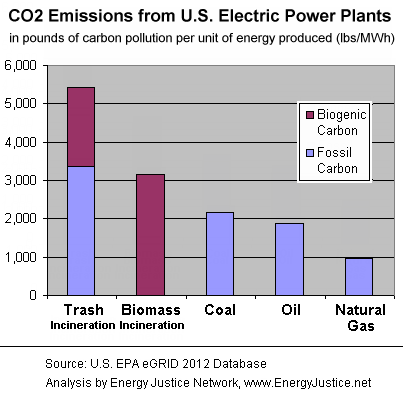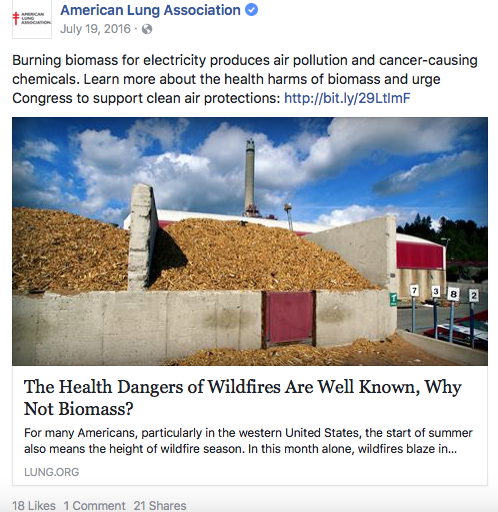By giving subsidies even to companies that would produce increased carbon and particle emissions from the production and burning of woody biomass sources including wood pellets, the Alberta government would be hurting, rather than helping to protect, the environment, and would be placing public health at risk.
An October 25, 2016 Alberta Government press release announced that the Alberta government’s Bioenergy Producer Program, which seems similar to a program that began in 2007 under a previous Conservative government, would provide $60 million in public funds for new short-term subsidies (retroactive to April 2016) to bioenergy producers in a program open to:
“… all bioenergy sectors that were previously eligible under the [expired Bioenergy Producers Credit Program (BPCP)], including biomass combustion, biogas electricity and heat, biofuels and wood pellets.”

(Image source: Energy Justice Network.)
As I wrote in a February 13 email to Shannon Phillips, Alberta’s Environment Minister and the Minister Responsible for the Climate Change Office, some of the Bioenergy Producer Program’s policies are:
“…very concerning, especially those that promote the burning of any solid biomass sources, such as any wood or wood pellet product. Wood and pellet burning is not clean energy. Rather, it is highly polluting. It is also not a low carbon, or carbon neutral energy source. Burning wood and pellets actually emits more CO2 than burning fossil fuels, and considerably more lung-damaging, climate-forcing particulate matter.
Industrial wood pellet plants create harmful pollution on a level that can be equal to or even worse than coal plant emissions. And on a residential scale, wood pellet stoves, like wood burning stoves, are far too polluting to be used in neighbourhood environments where cleaner alternatives exist, and where everyone shares the air. The very fact that major air quality management districts like California’s Bay Area Air Quality Management District (BAAQMD) ban the use of all wood and pellet burning appliances on high pollution days shows clearly why endorsing any solid biomass burning is a step in the wrong direction, if we want to help slow climate change, protect public health, protect clean, healthy air for all….
Regarding the recent Bioenergy Producer Program announcement, I think it is significant to note that the American Lung Association, which fully endorses a transition toward a clean energy future, does not support biomass burning for heat or power generation, for important health and environmental reasons.
I look forward to hearing from you, and especially look forward to receiving assurance that your ministry will please review those aspects of current and proposed policies that actually promote the burning of solid woody biomass fuels including wood pellets. Providing incentives for and encouraging those energy sources actually endangers climate, air quality, and public health. Instead, government policies at all levels really should be protecting the environment and public wellness, by encouraging a move away from, not toward, dirty energy sources.
Whether the polluting fuel being burned is coal or wood, neither is a source of clean energy, and both create pollution that contributes to climate change and harms the health of people.”
A February 9 post on the Environment Minister’s official public Facebook page, about a recent announcement made that day when the Bioenergy Producer Program’s list of approved applicants was made public, reflects how the program seems to make no distinctions between, for example, the production of relatively clean biogas fuels, and the burning of solid biomass sources, even though there are large differences between the amounts of emissions that the different industries produce and also their respective health and environmental impacts. Minister Phillips’ February 9 post says, without highlighting any such distinctions, that:
“Bioenergy plays a unique and important role in reducing emissions in Alberta. By using renewable sources of fuel from agriculture or forestry, bioenergy producers provide green, mortgage-paying jobs and help diversify our energy economy.
With the Bioenergy Producer Program, the government of Alberta is providing bridge funding to support the industry in its transition to self sufficiency and as it helps the province move toward a low-carbon future.”
There is at the time of this writing no other response or publicly viewable discussion visible below that statement, and the original post seems to give the clear impression that the government currently regards all biomass sources as equally useful, even though the burning of solid biomass sources is becoming increasingly understood to be an environmental problem, not a solution.
The polite and relevant comments, copied below, that my fellow clean air advocate Bill Lewin and I contributed to the page, below that February 9 post about the Bioenergy Producer Plan, are currently hidden from public view on the Minister’s page:
Bill Lewin – “Lumping in wood pellets to reduce green house gas is taking a huge step backwards. There are many studies proving biomass burning is a huge contributor to climate change. Obviously industry had their hand in this decision and the public will pay for it with their health. Burning of biomass is not carbon neutral.”
Cathy Baiton – “Regarding the statement above about using ‘sources of fuel from agriculture or forestry,’ I feel it’s very important to note that burning any type of solid biomass source such as wood or wood pellets is highly polluting and is not a low carbon or carbon neutral source of energy. — An article in Friday’s Lethbridge Herald suggested that some provincial policies might have the unhelpful effect of promoting the burning of pellets, which is very concerning. The air pollution created by wood or wood pellet burning causes harm to the environment and to public health….Many environmental and health organizations including the American Lung Association do not support biomass combustion for heat or power generation, because of the harmful health and environmental impacts of the associated air pollution. It is very worrisome, from a public health and air quality/climate protection perspective that, according to the Alberta government press release linked below, under the Bioenergy Producer Program: ‘Funding will be available to all bioenergy sectors…including bio-mass combustion, biogas electricity and heat, biofuels and wood pellets.'” https://www.alberta.ca/release.cfm…
Because these comments are not currently visible publicly on the Alberta Environment Minister’s page, neither is an American Lung Association public service announcement/blog post that I had posted as a link below my last comment, which some readers of the post might have found worth looking at, along with other information that Bill Lewin and I had offered in our (presently hidden) comments. Though it focuses on the problem of biomass pollution in the United States, the ALA article relates directly to problems inherent in the province’s Bioenergy Producer Plan, and addresses the harmful impacts of burning solid biomass fuel. In that piece, “The Health Dangers of Wildfire Smoke are Well Known; Why Not Biomass?” the American Lung Association points out that,
“Many people don’t realize how unhealthy biomass can be – including decision-makers in Washington, D.C. They need to hear from you that you support strong clean air protections to protect your family’s health.” – American Lung Association, 2016.
________________________________________________________________

(Image source: Facebook | The American Lung Association, July 2016.) This social media post is an example of some of the ALA’s good efforts to help raise awareness about the health and environmental impacts of burning solid biomass and to encourage citizens to ask their elected representatives to support stronger clean air protection.
A lack of public awareness about the health and environmental impacts of biomass burning pollution exists in Alberta, and this problem isn’t likely to change if, for example, all Canadian Lung Association chapters are not yet advocating strongly for clean air, and issuing statements like the American Lung Association public service announcements above, and if discussion about the issue is going to be censored – as it appears to be at present, on the Alberta Environment Minister’s Facebook February 9 post that talks about the Bioenergy Producer Program.
The Alberta government’s plan appears to treat all biomass sources equally without any distinctions or exclusions for the most polluting industries. The plan seems to equate a polluting company that burns wood pellets or other solid biomass fuel with one that produces a clean burning biogas fuel, even though the two types of industries differ widely in their environmental and health impacts. To really help protect the environment and to reduce carbon emissions, should the plan not at least have to exclude giving subsidies to any companies whose operations involve the production or the burning of wood or other solid biomass fuels?
By not making a clear distinction between different biomass sources and their respective environmental and health impacts, and by including even companies that produce and/or burn woody biomass products including wood pellets, the Alberta government’s plan is likely to create air quality and problems that could have harmful impacts now and far into the future.
The only hope for positive change depends upon increased public awareness – and more awareness among public officials – about the harmful health, climate, and environmental impacts of burning wood, wood pellets, and other solid biomass sources.
The Alberta Government’s press release about allocating transitional funding for the Bioenergy Producer Plan (and providing subsidies even to companies that burn solid biomass sources) was issued on October 25. Notably, only just over a month before, on September 13, a collective representing the American public health community signed an important letter opposing the promotion or expansion of biomass for the production of electricity in the US. Here is an excerpt from that letter:
Dear Senator/Representative:
The undersigned public health, medical and nursing organizations urge you to oppose policies that would encourage or expand the use of biomass for electricity production. Biomass is far from “clean” – burning biomass creates air pollution that causes a sweeping array of health harms, from asthma attacks to cancer to heart attacks, resulting in emergency room visits, hospitalizations, and premature deaths.
Biomass uses fuel sources, or feedstocks, whose combustion harms human health, including wood products, agricultural residues or forest wastes, and highly toxic construction and demolition waste. Burning biomass from any source generates immediate dangerous air pollution that puts health at risk….
Burning biomass creates proven harm to human health through direct air pollution impacts, as well as the potential for increasing climate change. Because of those threats, the undersigned public health, medical and nursing organizations ask that you oppose policies that would encourage or expand the use of biomass for electricity production. We urge you to protect human health by supporting the development of truly clean, carbon-free sources of energy such as solar energy and wind power.
Sincerely,
Allergy & Asthma Network
American Academy of Pediatrics
American Lung Association
American Public Health Association
Asthma and Allergy Foundation of America
National Association of County & City Health Officials National Environmental Health Association Physicians for Social Responsibilityhttp://www.lung.org/assets/documents/advocacy-archive/health-organizations-letter-biomass.pdf


You must be logged in to post a comment.